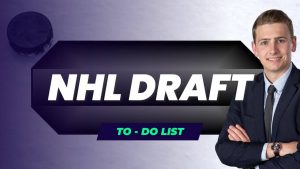[vc_row][vc_column][vc_column_text]Navigating budgeting can be quite daunting, particularly for young professional athletes.
In this post, we’ll delve back into the unique challenges athletes face and attempt to simplify an effective strategy to streamline their financial journey, which I’ve discussed in prior articles, How Much Should an NHL Player Save, and How Much of Their Salary do NHL Players Keep?
3 Reasons Why
Cash flow management can be more difficult for hockey players for the following reasons:
- Fluctuating Income Professional athletes often grapple with inconsistent income streams due to factors such as signing bonuses and seasonal pay periods. This financial uncertainty necessitates careful planning to ensure stability during off-seasons. Unlike traditional careers with incremental salary growth (i.e., a 3% pay increase annually), athletes must deal with shorter contract durations and varying income patterns.
- Elevated Expenses A high-performance lifestyle comes with substantial costs. From taxes and agent fees to coaches and accommodations, athletes must maintain a support network that directly impacts their performance. Moreover, the pressure to keep up with peers’ lavish lifestyles can further strain their finances. You are not immune from the “Keeping up with the Jones” Effect.
- Brief Career Span While the average person’s working life spans around three decades, the average professional sports career is shockingly brief – often less than five years. Even those who achieve a decade-long tenure are considered veterans in their field. This unique career length emphasizes the urgency of financial planning.
A Strategy for Financial Fitness
Saving for retirement might be straightforward in principle, but its execution demands discipline. Put another way – It’s SIMPLE, but not EASY. Here’s what we suggest:
The 20% Rule
Given the truncated career span and higher earnings of athletes, adhering to the traditional 10% savings rule falls short. Instead, athletes are advised to double this percentage and save 20% of their gross income. Why is the suggestion for the average person to save 10%, but for hockey players 20%? Two reasons: Your careers are way shorter, so we need to save more, and your incomes are much higher, so we should save more.
Applying the 20% Rule
To simplify the process, break down your income and spending as follows:
Step 1: Allocate 60% of your income to taxes and non-negotiable expenses, such as agent fees and escrow.
Step 2: Devote 20% of your earnings to investments.
Step 3: Live on the remaining 20% of your salary.
Using a $1,000,000 salary as an example, it would work like this:
Step 1: “My salary is $1,000,000, but like Adam said, I only really have $400,000”
Step 2: “Of this $400,000, I will invest $200,000.”
Step 3: “I have $200,000 left this year to fund my lifestyle – housing, car, entertainment, etc. and I will spend accordingly”.
Flipping the Mindset
Although it might be tempting to prioritize luxury purchases like cars and homes, altering your perspective on budgeting can have a profound impact on your future financial well-being. By embracing a future-oriented mindset, you can better secure your financial future.
Conclusion
Budgeting might present unique challenges for young professional athletes, but by adopting a tailored & simplified financial approach, these hurdles can be navigated effectively. The 20% rule, coupled with a shift in budgeting perspective, empowers athletes to not only manage their wealth during their athletic careers but also set a strong foundation for their post-playing days. You might scoff at me now, but you’ll thank me later.
Sources:
NHL Cash Flow by Justin Noble – Flipsnack
Chris Pronger Explains The Realities Of An Athlete’s Finances (awinninghabit.com)
What is the 10% Savings rule? – Texas Regional Bank
What is the Average Career Length of an NHL player? – Hockey Answered[/vc_column_text][/vc_column][/vc_row]






